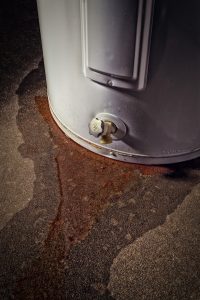What do you do with a rusted water heater in Fresno, CA? Most of the time, you replace it. Rust and other types of corrosion on a water heater usually signal that the system is beyond repair because of age, leaks, or neglect.
Fortunately, water heaters are designed to stay rust-free for most of their service lives—provided they receive the right attention with regular annual maintenance and prompt repairs as needed. Even though water heaters contain both metal and water—a combo to create rust—they have ways to keep that rust away.
The Water Heater’s Defenses
Rust (and other types of corrosion) occur when water and metal meet in the presence of oxygen. The oxygen part is critical to how water heaters prevent rust. Modern water heaters are designed to keep oxygen out of the tank. Older water heaters used to have a cushion of air at the top of their tanks to absorb pressure spikes. Today, a special expansion valve on top of the tank does this job without allowing oxygen into the tank where it might help rust start.
The most powerful weapon a water heater has against rust is a component called the sacrificial anode rod. This rod, made of two different types of metal, runs through the center of the tank, where it attracts the ions that promote rust to keep them away from the rest of the water heater. Essentially, the rod “sacrifices” itself to save the rest of the water heater. The rod needs to be replaced routinely before it rusts through completely and loses its potency.
Water heater tanks have a special inner lining of glass or porcelain to provide additional protection from corrosion, keeping the metal parts of the tank shielded from contact with water. Some water heaters have protective coatings on their exteriors to stop outside moisture from starting corrosion.
How Rust Can Start
It sounds like your water heater is in good shape when it comes to stopping rust. But that doesn’t mean rust can’t eventually win the battle—in fact, it’s often inevitable. You won’t keep the same water heater forever, after all.
The easiest way for rust to get a grip on your water heater is through maintenance neglect. Without regular maintenance, the sacrificial anode rod will rust completely and let corrosion start on the inside of the tank. Maintenance catches other problems that can also lead to oxygen getting into the tank and allowing for rust.
If your water has a high mineral content (hardness), it can speed up the development of corrosion. If you have hard water, we strongly recommend you have a water softener installed to protect the water heater and the rest of your home’s plumbing. Water leaks can also cause rust because they allow oxygen to infiltrate the tank.
Finally, rust is a common sign of a water heater that is simply too old to keep. If you have a water heater that’s more than 15 years old and you notice rust on it or see a rusty discoloration in your hot water, it’s time to schedule a replacement.
Call on Purl’s Sheet Metal & Air Conditioning for your water heater needs. Uncompromised Quality & Customer Service Since 1952.


